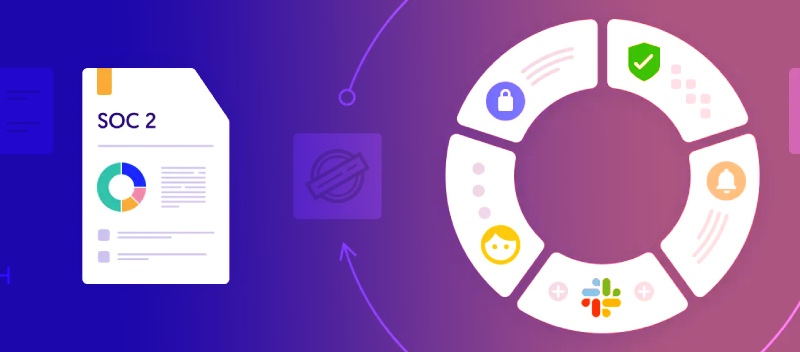In the current digital era, characterized by heightened concerns about data security and privacy, businesses need to take proactive measures to tackle these challenges, enabling them to seize new opportunities and facilitate expansion. SOC 2 Compliance serves as a beacon of trust and reliability for businesses, transcending mere regulatory adherence; it encompasses the strategic imperative of securing a competitive edge, enhancing market position, and driving sustained profitability. Delving into various dimensions, this blog comprehensively examines the manifold impact of SOC 2 compliance on businesses actively pursuing expansion initiatives and strategically capitalizing on emerging opportunities in the dynamic and evolving landscape of data security and privacy.
Understanding SOC 2 Compliance
SOC 2, a voluntary compliance standard established by the American Institute of CPAs (AICPA) for service organizations, outlines guidelines for the management of customer data. The standard, built on Trust Services Criteria encompassing security, availability, processing integrity, confidentiality, and privacy, allows organizations to tailor SOC 2 reports to their unique needs. Depending on their individual business practices, organizations can create controls aligned with one or more trust principles. These internal reports furnish crucial information to organizations, regulators, business partners, and suppliers, offering insights into how the organization effectively handles its data.
Adhering to SOC 2 not only enhances information security practices by enabling organizations to bolster defenses against cyber attacks and prevent breaches but also establishes a competitive advantage. Customers increasingly prefer working with service providers capable of demonstrating robust information security practices, particularly in the realm of IT and cloud services.
Building Trust and Credibility: As businesses broaden their operations and extend their influence to a wider audience, the imperative of establishing trust becomes paramount. SOC 2 compliance stands as a testament to an organization’s unwavering commitment to safeguarding sensitive information. Beyond reassuring existing clients, this certification becomes a formidable marketing tool, attracting new customers and forging partnerships.
Guiding Regulatory Compliance: Venturing into new markets frequently entails confronting diverse regulatory landscapes. SOC 2 compliance serves as a foundational layer, aiding businesses in seamlessly navigating these intricate regulatory frameworks. This not only mitigates legal risks but also facilitates market entry into regions with rigorous data protection requirements.
Addressing Cybersecurity Threats: Amid the rising threat landscape of cyberattacks, businesses expanding their digital presence must prioritize cybersecurity. The stringent standards for data protection and system security within SOC 2 serve as a robust defense mechanism, providing a shield for sensitive customer information and safeguarding intellectual property against potential breaches.
Expanding Business Horizons: SOC 2 compliance goes beyond being a defensive strategy; it represents a proactive initiative to unlock new business opportunities. In sectors such as technology, finance, and healthcare, many enterprises insist on SOC 2 compliance when choosing vendors or partners. Attaining this certification widens the array of potential collaborations and partnerships.
Enhancing Internal Operations: The path to SOC 2 compliance frequently requires a thorough evaluation of internal processes and systems. This introspective review results in enhanced operational efficiency, streamlined workflows, and a more secure infrastructure, establishing the foundation for scalable expansion.
Fostering Innovation: Within a competitive business environment, innovation stands as a pivotal factor in sustaining growth. SOC 2 compliance liberates resources that would otherwise be dedicated to addressing data security concerns, enabling organizations to shift their focus toward innovation and differentiation within their respective industries.
The Impact of SOC 2 on Business Growth and Opportunities
- Safeguards the Reputation of Your Brand: The significance of SOC 2 lies in its ability to safeguard your brand’s reputation, as even the most exceptional brand with a loyal customer base may face severe consequences if security measures are compromised, leading to a data breach or exposure. The potential fallout from a single breach is immense, encompassing substantial recovery and cleanup costs, the implementation of new controls, and the painstaking process of rebuilding customer trust. Embracing SOC 2 processes and controls becomes instrumental in shielding your company from these devastating repercussions.
- Sets You Apart from Competitors: While any company can assert its commitment to prioritizing customer safety and security, such claims lack persuasiveness without concrete evidence, and this is precisely what a formal SOC 2 audit provides, as achieving and maintaining SOC 2 compliance not only proves top-notch security measures but also signifies a commitment to safeguarding customer data, potentially serving as the distinguishing factor that encourages customers to choose your company over a competitor lacking a SOC 2 report, making SOC 2 certification a tangible and reassuring way to provide prospects with the peace of mind necessary to engage in business with your company.
- Draws in a Larger Customer Base: Achieving SOC 2 compliance not only enables you to appeal to security-conscious prospects, thereby enhancing your sales, but also positions your firm as a preferred choice for potential clients who prioritize SOC 2 certification for specific Trust Services Criteria. Additionally, this compliance fosters quicker trust-building with customers, leading to the development of more enduring customer relationships, an increased customer lifetime value, expanded growth opportunities, and a simultaneous reduction in marketing costs.
- Enhances the Quality of Your Services: SOC 2 prompts organizations to develop robust and enduring security processes, preventing the reactive management of security incidents, and further motivates companies to integrate security practices into their organizational culture, such as implementing multi-factor authentication or single sign-on, creating comprehensive documentation and policies, thereby incorporating these practices seamlessly into the daily operations and core identity of the company, ultimately facilitating the pursuit of significant business opportunities, whether in securing larger deals, preparing for mergers or acquisitions, or attracting new funding rounds.
Conclusion
As businesses consider expansion and aim to leverage emerging opportunities, SOC 2 compliance stands out as a strategic necessity. Beyond serving as a mere checkbox for regulatory requirements, SOC 2 acts as a catalyst for establishing trust, navigating intricate regulatory landscapes, and strengthening cybersecurity defenses. Through the adoption of SOC 2, organizations not only protect their existing operations but also position themselves as trustworthy partners in the continually evolving business landscape.











